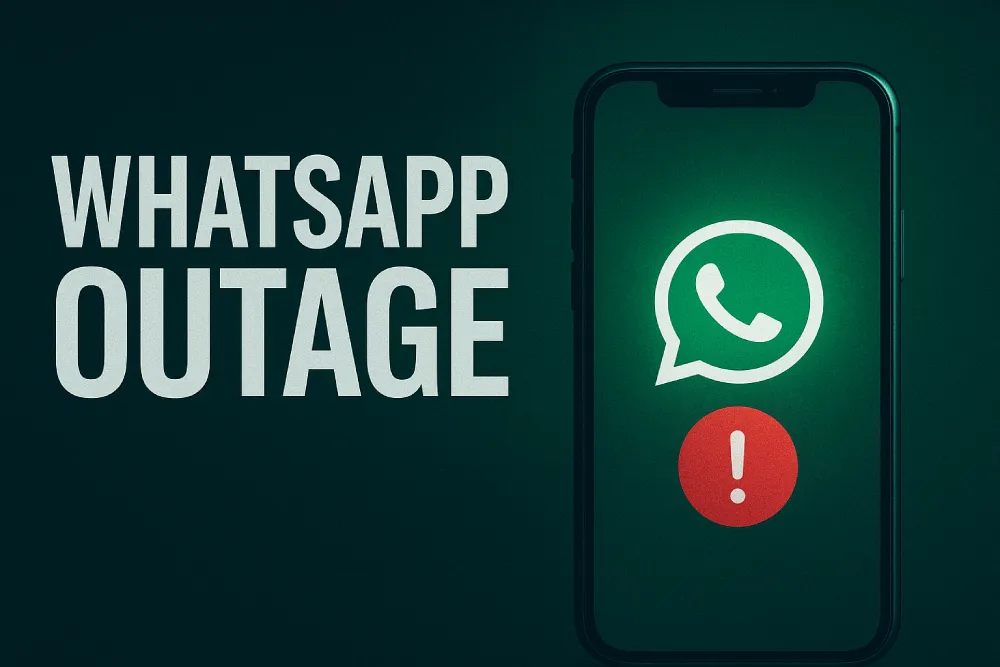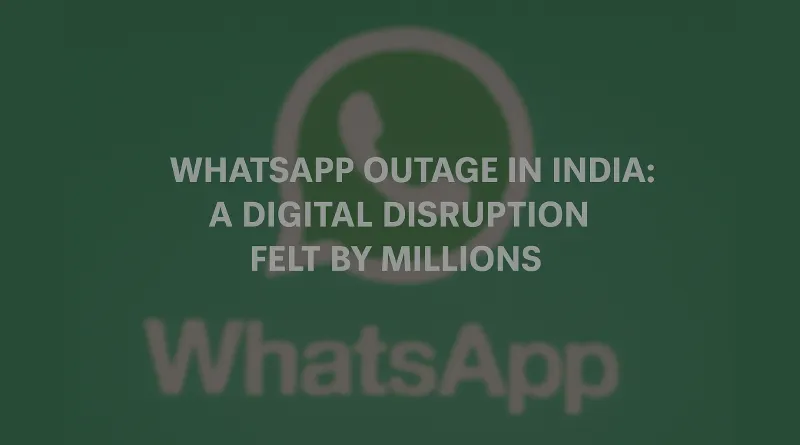WhatsApp Outage in India: A Digital Disruption Felt by Millions
Introduction
On July 24, 2025, WhatsApp, the Meta-owned messaging giant, experienced a significant outage in India, leaving millions of users unable to send messages or update their statuses. The disruption, which also affected Meta’s other platforms, Instagram and Facebook, sparked widespread frustration and highlighted India’s deep reliance on WhatsApp for communication, business, and social connectivity. With over 530 million WhatsApp users in India, the outage disrupted daily life, from personal chats to business transactions. This article explores the impact of the outage, its local context, and unique insights into what such disruptions mean for India’s digital ecosystem, drawing from credible sources like DownDetector and social media sentiment.
The Scale of the Outage
The outage started late during the evening of Thursday, and in accordance with DownDetector, there were 1,186 complaints posted at 11:16 PM IST, which further peaked to more than 3,229 at 8:24 PM. DownDetector reported that 81 percent of service users had problems with sending messages, 16 percent had problems with the general functionality of the app, and 3 percent had voice call problems. Users in diverse metro cities, such as Delhi and Mumbai, as well as smaller towns in India, went to X to express their irritation, as the hashtag #WhatsAppDown was the most popular item on the list. One of the users responding to X wrote, Is it me, or is your WhatsApp down too? Trying to post a status and they are taking forever to go through it is one of the best descriptions of confusion and frustration.
The disruption did not just affect WhatsApp. Others experienced the same on Instagram and Facebook, as some had problems uploading posts, and others had trouble accessing content. Although Meta has made no official comment, the interdependence of its systems implied a wider technical issue, perhaps server or DNS errors, as was the case in other outages. By the late evening, the services stabilized to a certain extent, although it was a reminder that India has a weak digital backbone.
Local Context: India’s WhatsApp Dependency
The biggest market of WhatsApp includes India, where 530 million people utilize the social network and the outages are especially significant. WhatsApp is not a messaging app in this case; it is a lifeline with communication, trade, and a sense of community. The app is ingrained in daily lives, whether through small businesses organizing through group chats or families updating each other about their lives. WhatsApp groups are used in villages for farming tips, local governance, and most of the things. It is used to facilitate e-commerce and gig economy purchases in cities such as Bengaluru and Hyderabad.
The outage was also associated with another outage, a country-wide Unified Payments Interface (UPI) failure earlier in the day, which hit applications such as PhonePe and Google Pay. National Payments Corporation of India (NPCI) explained the problem with the UPI with the occurrence of intermittent technical issues, and more than 3,000 complaints were registered. This combination of two types of disruption multiplied inconvenience, with a large proportion of Indian persons depending on WhatsApp to make transactions connected to the UPI, such as the payment of local sellers or bill partition. The flow-on effect of the digital services was jokingly indicated by one X user, who commented, with reference to the #WhatsAppDown, after the #UPIDown.

Unique Insights: The Ripple Effect on Society and Business
The outage highlighted the weak status of India’s digital economy, with WhatsApp being a key infrastructure for the micro-entrepreneurs and small businesses. An example is that WhatsApp is usually used when ordering from street vendors or kirana stores when making the order or making an arrangement for delivery. These operations were interfered with by the failure to message or update status, which cost thousands of small businesses money. In major cities such as Mumbai, where delivery services such as Zomato use WhatsApp to coordinate themselves in real-time, the failure would have resulted in delay and resulting dissatisfaction among customers.
The outage impeded community networks socially. WhatsApp groups are necessary for organizing school parent meetings and religious festivals in India. The failure to post status updates, which is one of the major elements of sharing ups and downs of life, angered users, with one X post complaining, This misunderstanding is indicative of a larger point of concern: users have a habit of directing their frustrations toward their devices or networks instead of recognizing that the problem has reached the platform-wide level, and as such, Meta needed to communicate the foul-up better to users.
The adventurous condition of Meta infrastructure through the outage was as well an issue of concern. The digital environment in India is interesting with its enormous user base and wide network conditions. Past accidents, such as the one in February 2025, when there were more than 9,000 complaints, indicate repeated problems with Meta servers. In contrast to the 2021 world outage caused by a DNS malfunction, the July 2025 incident did not have an obvious cause, which made users and analysts guess which of the possible reasons in the form of a server overload or software bug took place.
Broader Implications: Trust and Digital Dependency
This blackout raises one of the most important questions: how secure are the platforms we rely on? WhatsApp in India is not only about communication but also education, healthcare, and governance, where the government helpline and vaccine updates through the app take place. The disruptions lose the trust, especially when the response by Meta could not be timely. The absence of a concrete comment on the part of WhatsApp, reported on by various sources, caused bitterness and conjectures.
Furthermore, the outage shows the importance of diversification of the means of communication. Even though there are substitutes such as Telegram and Signal, the popularity and convenience that WhatsApp has in India mean that most people are not likely to switch their phones. Nevertheless, companies can think of contingency options to reduce its effects in future cases, considering that WhatsApp was recently partly down four times in 2020 alone.
Conclusion: Learning from Disruption
The WhatsApp outage that severely hit India in July 2025 was a grim reminder of how reliant the country has become on technology and how tech-based debacles have ripple impacts. Although the services were back within hours, this event affected millions of lives, from the small vendors to the social groups. To the technology-savvy Indian people, it was an eye-opener that required more openness by Meta and showed how dependable the platform was. With the country still in the process of going digital, with the government applying pressure to connect the entire nation with concepts such as Digital India, it is important to have good infrastructure. As far as users were concerned, the outage was an exasperating inconvenience, but to commercial concerns and communities, it became a costly nuisance. In the future, resilience and communication should be the top priorities of Meta in terms of retaining trust in its platforms.
Disclaimer
The information presented in this blog is derived from publicly available sources for general use, including any cited references. While we strive to mention credible sources whenever possible, Web Techneeq – Seo Company in Andheri does not guarantee the accuracy of the information provided in any way. This article is intended solely for general informational purposes. It should be understood that it does not constitute legal advice and does not aim to serve as such. If any individual(s) make decisions based on the information in this article without verifying the facts, we explicitly reject any liability that may arise as a result. We recommend that readers seek separate guidance regarding any specific information provided here.

